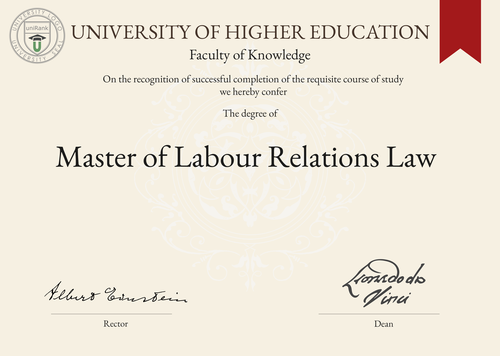
Master of Labour Relations Law (M.L.R.L.)
Guide to Master of Labour Relations Law Program/Course/Degree
Master of Labour Relations Law (M.L.R.L.)

Program Name
Master of Labour Relations LawProgram or Degree abbreviation
M.L.R.L.Duration range
The duration of the Master of Labour Relations Law program can vary depending on the country or university. Typically, it ranges from 1 to 2 years.Tuition range
The tuition fees for the Master of Labour Relations Law program can vary depending on the country or university. Generally, the range is between $10,000 and $30,000 per year.Overview
The Master of Labour Relations Law program is designed to provide students with a comprehensive understanding of the legal framework governing labor relations. It focuses on the study of labor laws, employment regulations, collective bargaining, dispute resolution and other related areas. This program equips students with the necessary knowledge and skills to navigate the complex legal landscape of labor relations.Curriculum Overview by year
The curriculum of the Master of Labour Relations Law program is structured to cover various aspects of labor relations law. The specific courses may vary depending on the university, but typically include: Year 1: - Introduction to Labor Law - Employment Contracts and Relations - Collective Bargaining and Negotiations - Labor Dispute Resolution - Labor Law in Practice Year 2: - Comparative Labor Law - International Labor Standards - Labor Law and Social Justice - Labor Law and Public Policy - Legal Research and Writing in Labor LawKey Components
The key components of the Master of Labour Relations Law program include a deep understanding of labor laws, employment regulations, collective bargaining, dispute resolution and the ability to analyze and interpret legal cases related to labor relations. Students also develop strong research and writing skills, as well as critical thinking and problem-solving abilities.Career Prospects
Graduates of the Master of Labour Relations Law program have various career opportunities in both the public and private sectors. They can work as labor relations specialists, employment lawyers, human resources managers, labor consultants, or policy analysts. They may find employment in government agencies, labor unions, law firms, multinational corporations, or non-profit organizations.Salary Expectations
The salary expectations for individuals with a Master of Labour Relations Law degree can vary depending on factors such as location, experience and job position. On average, professionals in this field can earn a salary ranging from $60,000 to $120,000 per year. For a more accurate understanding of salary expectations, you can utilize the Job Sites Search Engine, from our sister site jobRank, which searches over 4,600 job sites worldwide. Make sure to specify not only the job title but also the country you are interested in.Conclusions:
It is important to note that the duration, tuition fees, curriculum, key components, career prospects and salary expectations of the Master of Labour Relations Law program can vary depending on the country or university chosen for study. Prospective students should research and consider these factors when making decisions about where to pursue this degree. Visitors can search for universities offering the Master of Labour Relations Law program worldwide through the uniRank World Universities Search Engine.World Universities Search Engine
search for Master of Labour Relations Law (M.L.R.L.) and add the Location (country, state etc.) or specific University you are interested in studying at.
Query examples:
- Master of Labour Relations Law (M.L.R.L.) United States
- Master of Labour Relations Law (M.L.R.L.) United Kingdom online
- Master of Labour Relations Law (M.L.R.L.) Australia international students
- Master of Labour Relations Law (M.L.R.L.) University of California
- Master of Labour Relations Law (M.L.R.L.) University of London tuition fees
- Master of Labour Relations Law (M.L.R.L.) University of Sydney scholarships
Share Program/Course
Interesting? Share this program/course/degree info with your friends now.